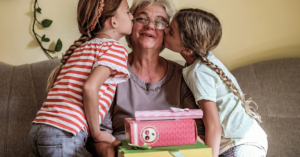A care home staff member, Hannah noticed that often Dotty would put up a fuss by yelling loudly around supper time. It was triggered by other care staff who, with good intentions, tried to get Dotty to stand up to go for her supper. With vigor and hype to get her motivated, they would say loudly, “It is time for supper!” At the same time, they would pull on her arms to help her get up and walk. Dotty would sit with resistance and use all her might and weight to not stand up. She would yell, “Leave me alone!” At the same time, she would push and slap people away.
Dotty was a sweet and frail older lady with mild Alzheimer’s disease, and she had gone completely blind.
It was evident to Hannah that Dotty just did not like being touched and physically pulled up. She knew it was suppertime, but the importance of this became inconsequential with the way she was roused to go for dinner.
Hannah came with a different approach, she could appreciate that being blind Dotty needed to be forewarned before she was touched. She sat beside Dotty without touching her at first, and said, “Hi Dotty, my name is Hannah and I’m sitting right beside you. I’m just here to see if you’re doing ok.” As Hannah sat beside Dotty she waited for her to calm down, and asked to hold her hand, which was a slow process but was allowed when Dotty relaxed. Hannah reassured her that she did not have to do anything she didn’t want to. Because of the distress, when asked again if she would like to go for supper, Dotty yelled, “No. I don’t want to!” Hannah said, “Oh, that’s ok. You don’t have to.” Hannah thought of another idea right away. “Dotty I was hoping to get some tea for myself, would you like any tea?” That was an inspiration! Dotty immediately perked right up and said, “I love tea; yes, I’d like some tea.”
A little patience, a less vigorous and calm approach and options for Dotty, are what she needed to feel she was the one making decisions. Using this approach, she felt she was not being told what to do, pulled on, or even touched by strangers. Many times, care staff forget that their job is to care for the emotions as well as the physical needs. Yes, it’s important to get clients to eat, but a caregiver must analyze a client’s reaction and adjust their caregiving approaches. Many times, with a reaction such as the one Dotty had, the client is saying that their emotional needs are not being met. She needed to feel safe and part of the decision to eat or any other activity this signifies.
Make sure you’re caring for the emotions as well, informing of your intentions, giving choices, not rushing, asking for permission, and guiding rather than pushing or forcing. This type of managing emotions comes with being mindful and it’s not always straightforward for everyone. I am always showing people how to be aware and mindful, and it is a training that I can give to anyone who needs it.
If you want to understand how to manage emotions in caregiving, please call me at 778-789-1496 for guidance.



